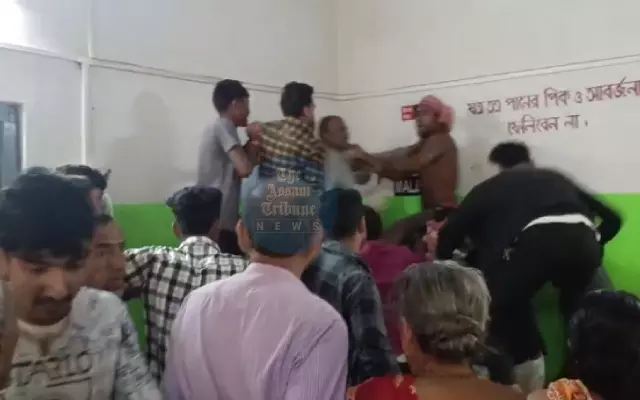In a tragic turn of events, a clash erupted over a land dispute in the Cachar district, leaving two individuals dead and 10 others injured. The incident underscores the simmering tensions and unresolved disputes over land ownership that continue to plague communities, often resulting in devastating consequences.
Cachar, situated in the northeastern state of Assam, is renowned for its lush green landscapes and diverse cultural heritage. However, beneath this serene facade lies a complex web of land-related conflicts that frequently escalate into violence. The recent clash serves as a stark reminder of the deep-rooted issues that remain unresolved, despite efforts to foster peace and reconciliation.
According to reports, the confrontation erupted in a remote village in Cachar, where two groups clashed violently over the ownership of a piece of land. The dispute, which had been festering for years, reached a boiling point as tensions flared and tempers ran high. What began as a verbal altercation soon escalated into a full-fledged confrontation, with both sides resorting to physical violence.
Amidst the chaos and pandemonium, lives were tragically lost, and several others sustained injuries of varying degrees. The casualties serve as a grim testament to the destructive consequences of unresolved conflicts, which not only claim lives but also tear apart the fabric of communities.
Land disputes are not uncommon in India, where issues related to land ownership, boundaries, and inheritance often lead to protracted legal battles and social unrest. In rural areas, where land is a primary source of livelihood and status, conflicts over land can have far-reaching implications, affecting not only the individuals directly involved but also their families and communities at large.
The situation in Cachar reflects a broader pattern of land-related conflicts that plague many parts of the country, particularly in regions with high population density and limited resources. Despite the enactment of various laws and mechanisms to address land disputes, the underlying issues persist, exacerbated by factors such as rapid urbanization, population growth, and changing land-use patterns.
Efforts to resolve land disputes often face numerous challenges, including bureaucratic red tape, inadequate legal mechanisms, and entrenched power dynamics. Moreover, the lack of effective land management policies and institutions further complicates the resolution process, leaving many disputes unresolved and communities vulnerable to escalating tensions.
In the aftermath of the clash in Cachar, authorities have vowed to investigate the incident thoroughly and take appropriate action against those responsible for the violence. However, addressing the root causes of land disputes requires more than just punitive measures; it demands a comprehensive approach that addresses underlying grievances, fosters dialogue, and promotes equitable access to land resources.
Community-based initiatives aimed at promoting conflict resolution, land reform, and resource-sharing can play a crucial role in preventing future conflicts and fostering sustainable development. By empowering local communities to manage their land resources effectively and equitably, it is possible to mitigate the risk of conflicts and promote peaceful coexistence.
Furthermore, investing in alternative livelihoods and economic opportunities can help reduce dependency on land-based livelihoods, thereby reducing the likelihood of conflicts over scarce resources. Initiatives such as skill development programs, microfinance schemes, and agricultural diversification can provide communities with the means to improve their livelihoods while reducing pressure on land resources.
Ultimately, resolving land disputes requires a concerted effort from all stakeholders, including government agencies, civil society organizations, and local communities. By addressing the underlying causes of conflict, promoting dialogue, and fostering inclusive development, it is possible to build resilient communities that are capable of resolving disputes peacefully and forging a path towards sustainable development.
As the people of Cachar mourn the loss of lives and grapple with the aftermath of the recent clash, it is imperative that efforts are redoubled to address the root causes of land-related conflicts and prevent similar tragedies from occurring in the future. Only through collective action and a commitment to justice and reconciliation can we hope to build a future where land disputes are resolved peacefully, and communities thrive in harmony.

